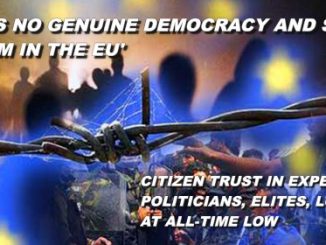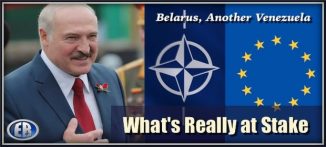
North Macedonia Is Being Used by NATO to Target Serbia and Russia
Its hasty accession into the alliance is only meant for weakening or preventing any Russian influence
PAUL ANTONOPOULOS
The North Macedonian House of Representatives unanimously approved on Monday (ER: February 10) for their country to accept the NATO Accession Protocol, taking the former Yugoslav Republic a step closer towards accession into NATO, which is expected to be completed and finalized in the spring.

North Macedonia’s rapid accession into NATO is only possible because of the Prespa Agreement signed between Athens and Skopje in June 2018, bringing an end to the name dispute between the two countries that emerged in 1991 with the breakup of Yugoslavia.

The Prespa Agreement, named after a lake that traverses the borders of Greece, North Macedonia and Albania, defined exactly what was meant by “Macedonia” and “Macedonian.” For Greece, according to the agreement, these terms denote an area and people of Greece’s northern region, who continue the legacy of the Ancient Macedonian Hellenic civilization, history and culture, as well as the legacy of Alexander the Great. In reference to North Macedonia, these terms denote the modern territory of North Macedonia, the Slavic language and Slavic people with their own history and culture unrelated to the Ancient Macedonians. The agreement also stipulates the removal of North Macedonian irredentist efforts against Greek territory and to align them with UNESCO and Council of Europe’s standards.
With Greece no longer blocking North Macedonia’s attempts to join NATO and the European Union, no time has been wasted to elevate the Balkan country into the Atlanticist organization. There is no doubt that the Prespa Agreement, which caused political turmoil in Athens and Skopje, was signed only for North Macedonia’s rapid entry into NATO.
The acceleration of North Macedonia into NATO is not only a key priority for the organization to reduce Russian influence in the Balkans, but to continue pressurizing Serbia (see map above) that was bombed by NATO in 1999 in response to the Serbian military operation against the “Kosovo Liberation Army” terrorist organization. North Macedonia, Serbia and Bosnia are the only non-NATO members remaining in the Balkans; however, it is important to remember that Bosnia is effectively a U.S. protectorate, while North Macedonia has been trying to join NATO since 1995 when Yugoslavia was completely destroyed in all but name. Serbia has no such ambition to join NATO and is considered a problematic country as it is the only remaining bastion of Russian influence left in the Balkans and is preventing full Atlanticist hegemony over the region.
Syriza, the ruling Party of Greece at the time of the signing of the Prespa Agreement, knew full well that the Prespa Agreement was largely despised by the Greeks, but nonetheless pushed for it and signed it. It is very obvious that the Prespa Agreement was to accelerate North Macedonia primarily into NATO, especially as not only Syriza, but also the current ruling party of New Democracy are loyal to NATO, with North Macedonia’s entry into the EU being only a consolation prize for Western powers. Less than a month after signing the Prespa Agreement, North Macedonia received an invitation to join NATO on 11 July 2018, with the accession protocol made in February 2019. North Macedonia’s accession into the EU, on the other hand, has made no progress since the Prespa Agreement was made.
For the Atlanticists, a rapid accession into NATO to contain and weaken Russian influence in North Macedonia and to also further constrain and pressurize Serbia was a higher priority than formalizing the Balkan country into the European neoliberal order as an official member. Although North Macedonia will undoubtedly join the EU eventually, it is not a matter of urgency as it is to make the country into a NATO member. The Prespa Agreement is highly unpopular in both countries as they both feel they have lost out and did not achieve their objectives of promoting their interests with the name issue. NATO was unwilling to risk the Prespa Agreement failing and the name issue re-emerging, which would once again put on hold North Macedonia’s accession into the organization.
North Macedonia cannot contribute to NATO in any meaningful way as it is a poor country of just over two million people and not close to the Russian border like the tiny Baltic states. Its accession into NATO is only for the purpose of weakening or preventing any Russian influence in the country and to further isolate Serbia. Despite North Macedonia being an overwhelmingly Orthodox and Slavic country that had the potential to become another pro-Russia state in the Balkans alongside neighboring Serbia, since its separation from Yugoslavia in 1991, Skopje pursued a pro-Western policy and joined the NATO program Partnership for Peace as early as 1995 and became a European Union candidate a decade later.
Why North Macedonia has pursued such a Western-centric policy since its separation with Yugoslavia is not clearly understood, but it is certainly understood why NATO has accelerated North Macedonia’s membership into its organization.
************
Original article

••••
The Liberty Beacon Project is now expanding at a near exponential rate, and for this we are grateful and excited! But we must also be practical. For 7 years we have not asked for any donations, and have built this project with our own funds as we grew. We are now experiencing ever increasing growing pains due to the large number of websites and projects we represent. So we have just installed donation buttons on our websites and ask that you consider this when you visit them. Nothing is too small. We thank you for all your support and your considerations … (TLB)
••••
Comment Policy: As a privately owned web site, we reserve the right to remove comments that contain spam, advertising, vulgarity, threats of violence, racism, or personal/abusive attacks on other users. This also applies to trolling, the use of more than one alias, or just intentional mischief. Enforcement of this policy is at the discretion of this websites administrators. Repeat offenders may be blocked or permanently banned without prior warning.
••••
Disclaimer: TLB websites contain copyrighted material the use of which has not always been specifically authorized by the copyright owner. We are making such material available to our readers under the provisions of “fair use” in an effort to advance a better understanding of political, health, economic and social issues. The material on this site is distributed without profit to those who have expressed a prior interest in receiving it for research and educational purposes. If you wish to use copyrighted material for purposes other than “fair use” you must request permission from the copyright owner.
••••
Disclaimer: The information and opinions shared are for informational purposes only including, but not limited to, text, graphics, images and other material are not intended as medical advice or instruction. Nothing mentioned is intended to be a substitute for professional medical advice, diagnosis or treatment.




